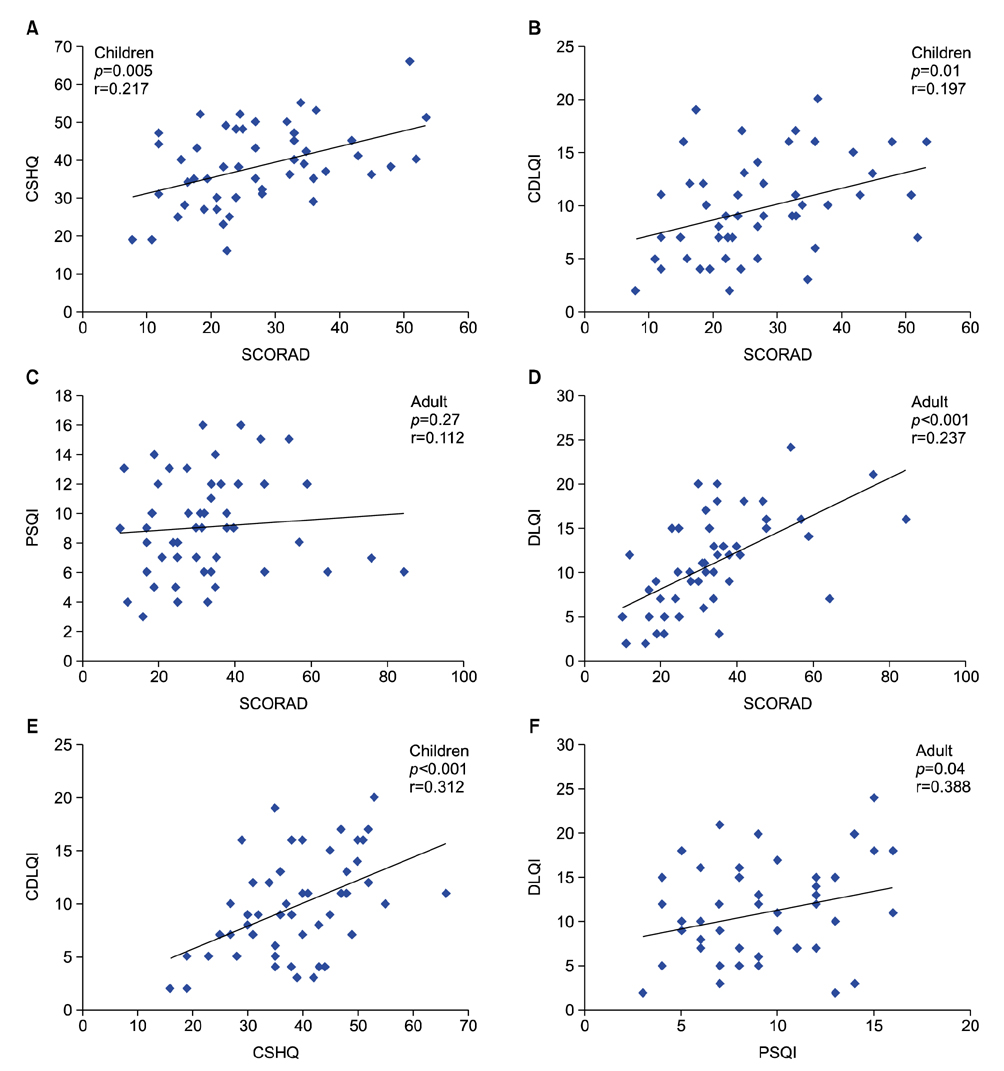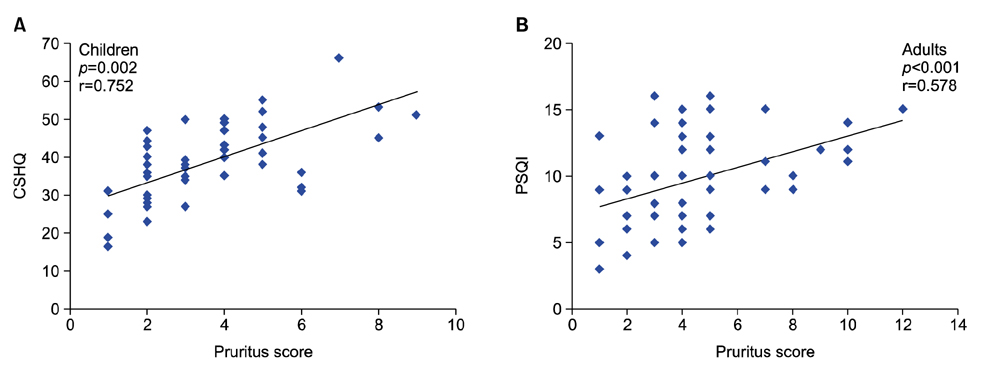Ann Dermatol.
2016 Jun;28(3):321-326. 10.5021/ad.2016.28.3.321.
Correlation between Severity of Atopic Dermatitis and Sleep Quality in Children and Adults
- Affiliations
-
- 1Department of Dermatology, Eulji Medical Center, Eulji University College of Medicine, Seoul, Korea. 20130044@eulji.ac.kr
- KMID: 2164639
- DOI: http://doi.org/10.5021/ad.2016.28.3.321
Abstract
- BACKGROUND
The atopic dermatitis (AD) can limit a patient's physical and psychosocial development as well as lower their overall quality of life (QOL), including sleep quality.
OBJECTIVE
The purpose of this study was to evaluate the relationships between clinical disease severity, QOL and sleep quality in children and adults with AD.
METHODS
The SCORing atopic dermatitis (SCORAD) was examined to evaluate the severity of AD in fifty adult AD patients and 50 children AD patients. A questionnaire based on the children's sleep habits questionnaire (CSHQ) and the children's dermatology life quality index (CDLQI) were used to evaluate QOL and sleep disturbance in children AD patients. The Pittsburgh sleep quality index (PSQI) and dermatology life quality index (DLQI) were used in adult AD patients.
RESULTS
The SCORAD and CSHQ score, the SCORAD and CDLQI score and the CSHQ and CDLQI score demonstrated significant correlations. The SCORAD and PSQI score showed no significant correlation. However, there were significant correlations between the SCORAD and DLQI score and the PSQI and DLQI score.
CONCLUSION
Increasing severity of AD affects sleep quality in child AD patients. In adults, even though the total score of the sleep questionnaire is not associated with the severity of AD, two components of sleep questionnaire are associated with the severity of AD. There is a significant correlation between sleep quality and QOL in both children and adults. Therefore, we suggest that evaluating the sleep quality as well as clinical severity of the disease is necessary in the management of AD patients.
Keyword
Figure
Cited by 1 articles
-
Amount of Consumed Medicines as a Severity Index for Chronic Inflammatory Skin Disorders
Eun Jung Byun, Chun Wook Park, Sang Hyun Cho
Ann Dermatol. 2018;30(3):386-388. doi: 10.5021/ad.2018.30.3.386.
Reference
-
1. Bender BG, Ballard R, Canono B, Murphy JR, Leung DY. Disease severity, scratching, and sleep quality in patients with atopic dermatitis. J Am Acad Dermatol. 2008; 58:415–420.
Article2. Camfferman D, Kennedy JD, Gold M, Martin AJ, Lushington K. Eczema and sleep and its relationship to daytime functioning in children. Sleep Med Rev. 2010; 14:359–369.
Article3. Homey B, Steinhoff M, Ruzicka T, Leung DY. Cytokines and chemokines orchestrate atopic skin inflammation. J Allergy Clin Immunol. 2006; 118:178–189.
Article4. Severity scoring of atopic dermatitis: the SCORAD index. Consensus Report of the European Task Force on Atopic Dermatitis. Dermatology. 1993; 186:23–31.5. Owens JA, Spirito A, McGuinn M. The Children's Sleep Habits Questionnaire (CSHQ): psychometric properties of a survey instrument for school-aged children. Sleep. 2000; 23:1043–1051.
Article6. Lewis-Jones MS, Finlay AY. The Children's Dermatology Life Quality Index (CDLQI): initial validation and practical use. Br J Dermatol. 1995; 132:942–949.
Article7. Buysse DJ, Reynolds CF 3rd, Monk TH, Berman SR, Kupfer DJ. The Pittsburgh Sleep Quality Index: a new instrument for psychiatric practice and research. Psychiatry Res. 1989; 28:193–213.
Article8. Finlay AY, Khan GK. Dermatology Life Quality Index (DLQI)--a simple practical measure for routine clinical use. Clin Exp Dermatol. 1994; 19:210–216.
Article9. Mostaghimi L. Prevalence of mood and sleep problems in chronic skin diseases: a pilot study. Cutis. 2008; 81:398–402.10. Camfferman D, Kennedy JD, Gold M, Simpson C, Lushington K. Sleep and neurocognitive functioning in children with eczema. Int J Psychophysiol. 2013; 89:265–272.
Article11. Yano C, Saeki H, Ishiji T, Ishiuji Y, Sato J, Tofuku Y, et al. Impact of disease severity on sleep quality in Japanese patients with atopic dermatitis. J Dermatol Sci. 2013; 72:195–197.
Article12. Koca R, Altin R, Konuk N, Altinyazar HC, Kart L. Sleep disturbance in patients with lichen simplex chronicus and its relationship to nocturnal scratching: a case control study. South Med J. 2006; 99:482–485.
Article13. Reuveni H, Chapnick G, Tal A, Tarasiuk A. Sleep fragmentation in children with atopic dermatitis. Arch Pediatr Adolesc Med. 1999; 153:249–253.
Article14. Holm EA, Wulf HC, Stegmann H, Jemec GB. Life quality assessment among patients with atopic eczema. Br J Dermatol. 2006; 154:719–725.
Article15. Chamlin SL, Cella D, Frieden IJ, Williams ML, Mancini AJ, Lai JS, et al. Development of the Childhood Atopic Dermatitis Impact Scale: initial validation of a quality-of-life measure for young children with atopic dermatitis and their families. J Invest Dermatol. 2005; 125:1106–1111.
Article
- Full Text Links
- Actions
-
Cited
- CITED
-
- Close
- Share
- Similar articles
-
- Difference of Malassezia Species and Pityrosporum ovale Specific IgE in Head and Neck Lesions of Atopic Dermatitis Related to Ages and Severity
- Home Nursing and Quality of Life in Parents of Children with Atopic Dermatitis
- The Effect of Antigen Sensitization and Development of Respiratory Allergy Disease on Severity of Atopic Dermatitis
- Factors Affecting the Improvement of Adult Atopic Dermatitis in Their 20s and 30s: The Seventh Korean National Health and Nutrition Examination Survey, 2016–2018
- Measurement of Atopic Dermatitis Disability



